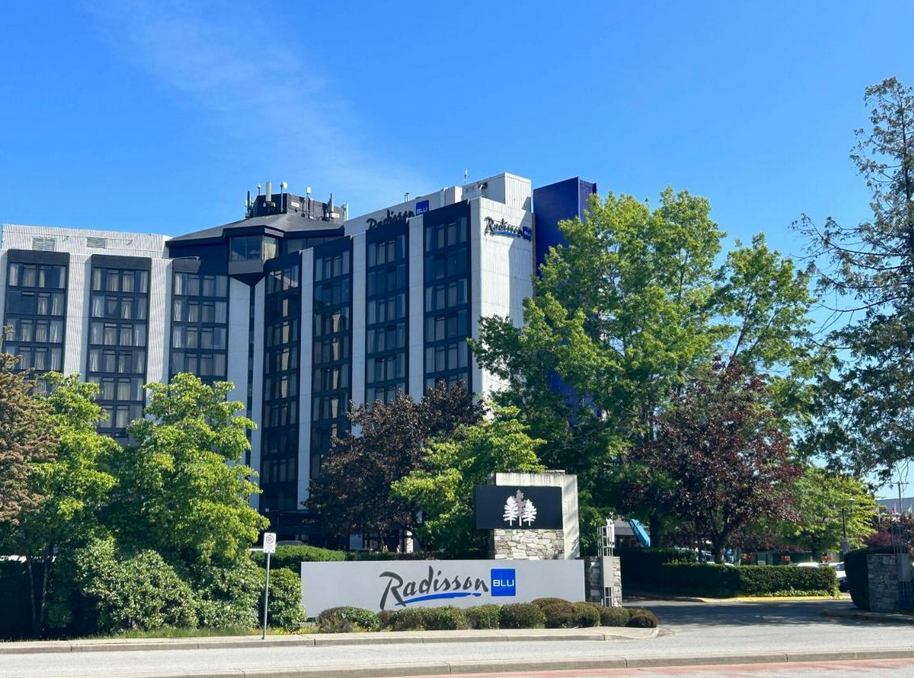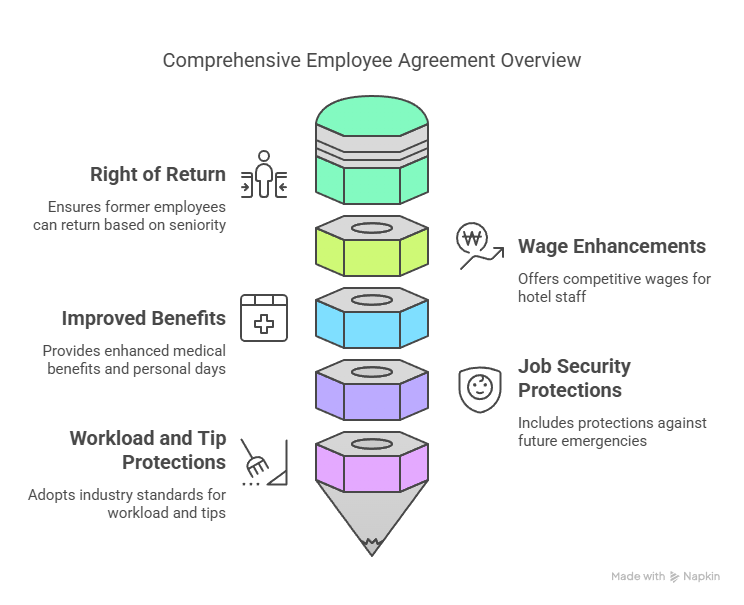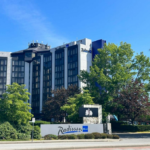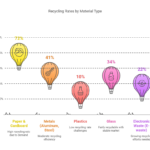The Pacific Gateway Hotel strike in Richmond, British Columbia, stands as a landmark event in Canadian labor history. Spanning nearly four years from May 2021 to March 2025, this strike not only became the longest hotel labor dispute in the nation but also underscored significant issues surrounding worker rights, job security, and the impact of the COVID-19 pandemic on the hospitality industry.
Background and Causes
In April 2020, amidst the global upheaval caused by the COVID-19 pandemic, the Public Health Agency of Canada (PHAC) designated the Pacific Gateway Hotel as a quarantine facility for international travelers arriving in Vancouver. To manage the increased responsibilities, the Red Cross was brought in to perform duties typically handled by the hotel’s staff. This move led to the layoff of approximately 143 employees, accounting for about 70% of the hotel’s workforce. Unlike other establishments that reinstated their employees as pandemic restrictions eased, the Pacific Gateway Hotel opted not to recall these workers, leading to growing tensions between the management and staff.
Initiation of the Strike
On May 3, 2021, in solidarity with their terminated colleagues, the remaining employees—comprising room attendants, front desk agents, cooks, dishwashers, servers, baristas, housemen, and maintenance workers—initiated a strike. Their primary demands included the reinstatement of the laid-off workers and the reversal of wage and working condition rollbacks. This collective action marked the beginning of what would become the longest strike in Canadian history.
Prolonged Dispute and Challenges
Throughout the duration of the strike, the workers, represented by UNITE HERE Local 40, maintained daily picket lines, demonstrating unwavering commitment despite facing numerous challenges. The British Columbia Federation of Labour and the Canadian Labour Congress supported the strikers by organizing a boycott of the hotel. The dispute saw multiple interventions from the British Columbia Labour Relations Board, addressing issues such as the hotel’s attempts to ban picketing on its premises and allegations of using replacement workers, commonly referred to as “scabs.” These legal battles highlighted the complexities and tensions inherent in labor disputes, especially those prolonged over several years.
Resolution and Agreement
After 1,411 days of striking, a resolution was achieved in March 2025. With the assistance of mediator Ken Saunders, UNITE HERE Local 40 and the hotel’s management reached a new collective agreement. The key provisions of this agreement included:
- Right of Return: All former employees terminated during the pandemic were granted the right to return based on seniority, with a recall period extending for 36 months.
- Wage Enhancements: The agreement established the highest hotel wages in the Vancouver Airport and Richmond market, with returning room attendants earning up to $28.25 per hour and cooks up to $32.50 per hour.
- Improved Benefits: Employees received enhanced medical benefits with lower eligibility requirements, new personal days, and provisions allowing sick days to be carried over.
- Job Security Protections: The contract included unlimited recall protections in the event of future pandemics, emergencies, or renovations, ensuring greater job security for the workforce.
- Workload and Tip Protections: The agreement adopted industry-leading standards, such as daily room cleaning to ensure high sanitation and manageable workloads, along with new gratuity and transparency protections for tipped workers.
Impact and Significance
The conclusion of the Pacific Gateway Hotel strike marked a significant victory for labor rights in Canada. It demonstrated the power of worker solidarity and resilience in the face of prolonged adversity. The strike’s resolution not only reinstated jobs and improved working conditions for the hotel’s employees but also set a precedent for labor negotiations in the hospitality industry, emphasizing the importance of fair treatment and job security for workers.
Community and Political Support
Throughout the duration of the strike, the Pacific Gateway Hotel workers received substantial support from various community organizations, labor unions, and political figures. The British Columbia Federation of Labour and the Canadian Labour Congress played pivotal roles in organizing a boycott of the hotel, urging both individuals and organizations to refrain from patronizing the establishment until the labor dispute was resolved. This collective action amplified the workers’ voices and applied economic pressure on the hotel’s management.
Local political leaders also lent their support. In 2023, Richmond City Council passed a motion to boycott the hotel, committing not to hold any city events or promote business with the establishment until a fair resolution was reached. This move highlighted the broader community’s solidarity with the striking workers and underscored the significance of fair labor practices within the city.
Legal Battles and Labor Relations Board Interventions
The protracted nature of the strike led to numerous legal confrontations between UNITE HERE Local 40 and the hotel’s management, requiring interventions from the British Columbia Labour Relations Board (BCLRB). One significant issue was the hotel’s attempt to prohibit picketing on its premises, citing trespassing concerns. The BCLRB ruled in favor of the workers, affirming their right to picket during a lawful strike.
Another contentious point was the alleged use of replacement workers, commonly referred to as “scabs,” by the hotel to maintain operations during the strike. The union filed multiple complaints, leading the BCLRB to order the hotel to provide disclosures on work performed and to undergo random inspections to ensure compliance with labor laws. These legal battles highlighted the complexities of labor relations and the importance of regulatory bodies in upholding fair practices.
Broader Implications for Labor Movements
The resolution of the Pacific Gateway Hotel strike carries significant implications for labor movements across Canada and beyond. The successful outcome underscores the effectiveness of sustained collective action and serves as a beacon for other unions and worker groups facing similar challenges. It highlights the critical role of solidarity, not only among workers but also within the broader community, including other labor organizations, political entities, and the public.
Media Coverage and Public Perception
The strike garnered extensive media attention over its nearly four-year duration, bringing national and international focus to labor practices within the hospitality industry. Coverage highlighted the resilience of the workers and the complexities of labor disputes during unprecedented times, such as a global pandemic. This visibility played a crucial role in shaping public perception, garnering widespread support for the strikers, and applying pressure on the hotel’s management to negotiate a fair settlement.
Analysis of Negotiation Strategies
The prolonged negotiations between UNITE HERE Local 40 and the hotel’s management offer valuable insights into effective labor negotiation strategies. The union’s steadfast commitment to its demands, coupled with strategic legal actions and community engagement, exemplifies a multifaceted approach to labor disputes. The involvement of a mediator, Ken Saunders, was instrumental in bridging gaps between the parties, highlighting the importance of neutral facilitation in resolving protracted disputes.
Impact on Hotel Operations and Reputation
The strike undoubtedly impacted the hotel’s operations and reputation. The prolonged absence of experienced staff likely affected service quality, while the boycott led by labor organizations and supported by the community would have had financial implications. The resolution of the strike and the terms of the new agreement may serve to rebuild the hotel’s reputation, demonstrating a commitment to fair labor practices and employee welfare.
Reflections from Union Leadership
Union leaders have reflected on the strike as a defining moment in labor history. Zailda Chan, president of UNITE HERE Local 40, emphasized the courage and determination of the workers, stating that their unwavering stance not only secured their jobs but also set a precedent for labor rights in the hospitality industry. This sentiment underscores the broader impact of the strike beyond the immediate gains for the workers involved.
Personal Stories of Resilience
The strike’s longevity brought to light numerous personal stories of resilience and dedication among the workers. Many of the employees were long-serving staff members, with some having dedicated over four decades to the hotel. For instance, Marlyn, a supervisor who began as a room attendant, marked her 45th work anniversary during the strike. Despite personal health challenges and financial hardships, she remained steadfast on the picket line, emphasizing her commitment to achieving a fair resolution.
Similarly, Yankatamma Reddy, an immigrant from India, had worked at the hotel for 44 years. After the passing of her husband, she relied on the union’s support and remained active in the strike, underscoring the deep sense of community and solidarity among the workers. These narratives exemplify the human element behind labor disputes and the profound impact on individuals and their families.
Comparisons to Other Labor Disputes
The Pacific Gateway Hotel strike surpassed previous records to become the longest hotel labor dispute in Canadian history. Prior to this, the Hilton Metrotown lockout, which lasted over a year, was among the most notable labor disputes in the country’s hospitality sector. In that instance, workers secured full recall rights for terminated employees and achieved significant improvements in wages and benefits. The success of the Hilton Metrotown workers served as a source of inspiration and a benchmark for the Pacific Gateway strikers, demonstrating the potential outcomes of sustained collective action.
Economic and Industry Implications
The strike had broader implications for the hospitality industry in British Columbia and Canada at large. It brought attention to the vulnerabilities faced by hospitality workers, especially during crises like the COVID-19 pandemic. The dispute highlighted the need for robust job security provisions, fair recall rights, and equitable treatment of workers during unforeseen circumstances. The resolution of the strike set a precedent, encouraging other establishments to reevaluate their labor practices and prioritize fair treatment of employees.
Lessons Learned and Future Outlook
The Pacific Gateway Hotel strike serves as a case study in labor relations, emphasizing the importance of solidarity, community support, and legal frameworks in addressing labor disputes. It underscores the necessity for employers to engage in fair negotiations and recognize the invaluable contributions of their employees. For workers, it highlights the power of collective action and the significance of standing firm in the pursuit of justice and equity.
As the hospitality industry continues to recover from the impacts of the pandemic, the lessons gleaned from this strike will undoubtedly influence future labor practices, negotiations, and policies, fostering a more equitable and resilient workforce.










